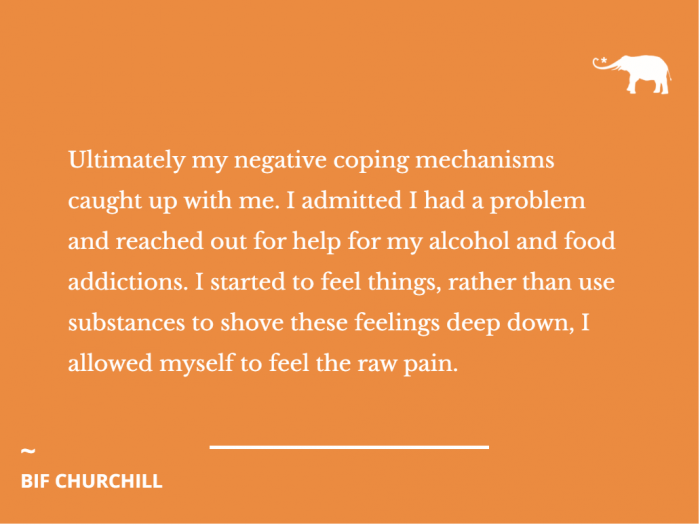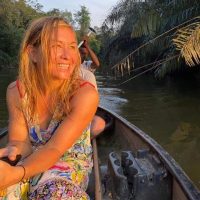View this post on Instagram
I want to talk about my complex trauma, but as soon as the words pour out of me, the air seems to thicken.
A heaviness weighs down the atmosphere and all those around me. After I stop talking, the awkward silence assaults my senses.
Sometimes I regret saying anything. As an extraordinarily upbeat person, this was never like me; but things change. I have complex trauma. I want to—I need to talk about it—even if you don’t want to hear it. I need you to simply listen with an open heart, tell me my feelings are valid, and extend empathy.
I had an almost idyllic childhood, playing outside with my sisters and the neighborhood kids. In the 80s and 90s, we wandered freely and only returned home when my mother rang the supper bell. It was safe; we never locked our door and sometimes left keys in our unlocked—and sometimes running—cars. I learned to trust people.
Fast forward a few decades, and I found my calling in the Peace Corps in 2004. In Ghana, my eyes were opened and there was never going back. I spent the first seven years of my international career infused with a trusting nature: believing that people were inherently good, and since I was trying to do good, only good would come to me. I was wrong.
In 2009, in Kampot, Cambodia, as I slept under my mosquito netting, I felt a touch. I figured it was the cat who liked to prowl about in the traditional Cambodian stilt house an absent ex-pat had allowed me to occupy. Then the cat said, “I love you,” and I jolted awake. There was a man kneeling beside my bed stroking my arm. At that moment, I remembered an article I had read regarding the Hmong tribe in Laos: they used to rape women in their home at night to claim them as their bride, the logic being that no one else would want a defiled woman.
Suddenly a jolt of energy shot through my body, and I overpowered him for a second releasing a visceral shriek. He bolted out the door, jumped from the second-floor balcony, and I watched as he ran, his silhouette bleeding into the darkness. I realized he must have thought I was possessed: Cambodians have a strong belief in ghosts and spirits. After this incident and most of those following it, I was so alone. With no one to turn to, this was probably the hardest part.
From that moment on the aggression and attention from men worsened. I don’t know why. I believe that attack activated something in me that drew it to me. Maybe fear and distrust. I don’t blame myself, but from that moment, it didn’t stop. Men would hit me on their motorcycles while I was riding my bike laughing uproariously as they sped away, leaving me seething and feeling helpless, as I envisioned pounding their heads in with large rocks.
I moved to Phnom Penh, Cambodia, and while running one early morning I encountered a man urinating on the side of the road. He flashed me from his motorcycle then pursued me as I ran toward a light ahead. A security guard heard my screams of “help” wavering as my heart pounded up into my throat. My pursuer retreated from the advancing security guard. Again, catastrophe averted.
When I returned to West Africa in 2015, the violence continued, but it felt more economic. Sure, I was still hit on while riding my bike and groped sometimes in markets—but in Liberia, during a morning beach run, I was tackled from behind for my iPod. At first, I grabbed a large stick and charged after him, but when he went after me with a rock, I dropped the stick ran, my sense overpowering my rage.
Still, I didn’t stop to process these events. These traumas fed my addictions: I drank, ate, worked, exercised, moved to new countries, watched Netflix, and busy minded myself to cope with the painful emotions and sensations these events evoked. I didn’t want to touch the pain.
In 2017, in Sierra Leone, West Africa. I loved the work, even during the time of COVID-19 and isolation. One morning in 2020, I awoke with a tall man looming over me, jolting me from a deep sleep. The crashing waves from the seafront drowned my screams. He pinned my hands down, then his hand slapped down on my right upper thigh. As in Cambodia, a primordial survival instinct shot through me. I overpowered him, tumbling off the bed, and saw another man lit by the bathroom light. I ran the 200-feet uphill to the guard, barefoot in a torn nightgown. He came, but they were gone, having escaped on the boat they came in on.
Curiosity got the best of me, and I pursued the matter in court after they caught one of the other thieves, but not my attacker. The court processes were brutal and re-traumatizing. Eventually, he was let go. Even with those small successes, I didn’t allow myself to acknowledge the pain and anxiety that event triggered, compounding over a decade of traumatic experiences.
Ultimately, my negative coping mechanisms caught up with me. I admitted I had a problem and reached out for help for my alcohol and food addictions. I started to feel things, rather than use substances to shove these feelings deep down; I allowed myself to feel the raw pain. For lack of a better word, it sucked, but it was far better than the impending misery after feeding my addictions.
Looking back, I am in awe of how long I made it. I continued to stay living overseas despite feeling unsafe because I believe that all people deserve access to everything I took for granted. I spent many years working abroad with others to address basic needs like running water, a toilet, food, shelter, and a chance for work and education—needs that are still looming and formidable. Never forget to be grateful for all you have, as many will never have the chance to experience privileges that you enjoy daily.
I tell you my story for two reasons. First, the trauma fed my addictions, which in turn made me depressed, which led to the addiction to escape the misery. The interplay of the three is real, and I know many people with trauma who remain stuck in these vicious cycles.
To truly heal from complex trauma, you need to do the work. Through this, along with a lot of self-reflection, support, and recovery work, I have found I no longer desire to use these negative coping mechanisms, and because of the challenges I’ve overcome, I am happier than I have ever been.
Finally, but most importantly, I want to remind everyone October is Domestic Violence Awareness Month. While I have had plenty of traumatic experiences, they were short-lived, and I returned home to a safer space free of immediate threats. Some of those experiencing domestic violence spend every day living with this threat and the perpetrator, experiencing a deep psychological and emotional harm on top of physical abuse many of us can’t even begin to fathom.
Additionally, one in three women experiences sexual violence in their lifetime. While veterans seem to be the familiar manifestation of post-traumatic stress disorder (PTSD), let us not forget a full third of our women and young girls have experienced or will experience trauma. If you or anyone else is experiencing domestic or intimate partner violence, please reach out to the National Domestic Violence Hotline at 800.799.SAFE (7233).
If you can, take the time to listen, validate, and extend empathy to our survivors. Survivors will know they are not alone and receive support to begin the transition from a victim to a victor. After 15 years of living and working overseas, I have returned home to Maine, where I am learning to trust again. My heart and prayers go out to anyone who can identify with my experiences.












Read 0 comments and reply